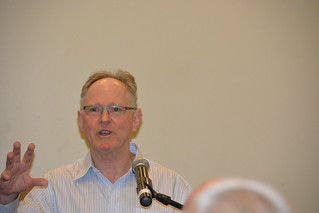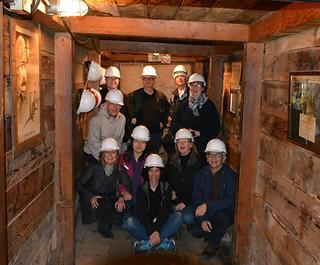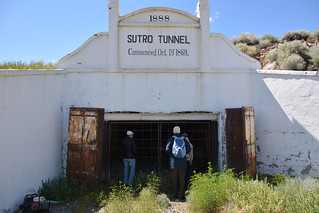
PREV ARTICLE
NEXT ARTICLE
FULL ISSUE
PREV FULL ISSUE
2016 DAMIN CONFERENCE VISITS SAN FRANCISCO
Georges Depeyrot submitted this information about the May 2016 meeting of the DAMIN program on “Depreciation of Silver : Monetary
and International Relations”, which was held in San Francisco and Virginia City where they visited the Comstock Lode. Thanks! Shown below
is speaker Dennis O'Flynn, a group of participants visiting a Virginia City silver mine, and the entrance to the Sutro Tunnel.
-Editor
From the pre-conference announcement:
The object is to encourage broad historical analysis of diverse trade objects in relation to means of exchange, including geological concentrations of raw materials across the globe, exploration, mining (in the case of metals), monetary production (including minting), and distribution of final products to end-markets throughout the world. Envisioning monetary history broadly is important because control of raw materials conferred economic power, as did fabrication of monies, exchange of monies for other monies, and exchange of monies for non-monetary items. Equivalent linkages existed for non-metallic payment devices documented throughout history. In some cases, uneven distribution of mines across the globe induced authorities to adopt alternative means of payment, such as chocolate, cowries, rice, beans, textiles, and numerous other monetized objects. These choices influenced social, political, and trade relations, leading to diverse monetary arrangements and various paths of economic development around the world. From the post-conference Proceedings: Given emphasis upon nineteenth-century topics at this 2016 California conference, organizers decided to meet initially for two days in San Francisco, a city founded in response to California’s post-1848 Gold Rush, yet propulsion of metropolitan San Francisco to global status depended upon post-1859 Comstock Lode silver discoveries in Nevada (as emphasized in conference presentations).
For more information on DAMIN, see:
Wayne Homren, Editor The Numismatic Bibliomania Society is a non-profit organization promoting numismatic literature. See our web site at coinbooks.org. To submit items for publication in The E-Sylum, write to the Editor at this address: whomren@gmail.com To subscribe go to: https://my.binhost.com/lists/listinfo/esylum All Rights Reserved. NBS Home Page Contact the NBS webmaster 
|


